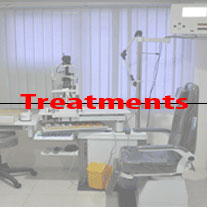
Mungale Eye Hospital is a super specialist eye care treatment center which serves each patient with an objective to prevent deterioration to correcting vision related problems. Our eye specialist Dr.Meeta and Dr. Sachin Mungale can efficiently do this due to their years of experience, expertise, knowledge and an exceptional array of corrective procedures and implementation of cutting edge technology to treat their patient in a better way.
At our advance eye care center all the treatments that we provide are as follows:
GLAUCOMA
DIAGNOSTIC FACILITIES
ANTI GLAUCOMA SURGERIES
FACILITIES AVAILABLE CORNEA CLINIC
DIAGNOSTIC FACILITIES
SURGICAL EXPERTISE
To schedule an Appointment at Mungale Eye Hospital, you will need to call on 0265-6580311 or 0265-2430101 between 9am to 6.30 pm on week days.
The hospital is closed on Sundays.
Visit the Mungale Eye Hospital to obtain copy of your Medical Records.
The eye needs light in order to work, but too much bright sunlight may be associated with damage to the retina (age related macular degeneration). It is sensible therefore always to wear a hat/cap with a brim or dark glasses when out in bright light.
The most important environmental factor associated with eye disease is smoking – smoking is bad for retinas. Yet another reason to give up the habit!
Diet is also important – dark green leafy vegetables (spinach, kale, and broccoli) contain micronutrients that are important for the health of the retina. A balanced diet is sensible for all sorts of reasons.
Vitamin and mineral supplements in the form of pills or powders have a limited role in protecting the eyes in someone eating a balanced diet. There are some forms of age related macular degeneration that can be helped by these pills – consult your doctor if in doubt. Remember that too many supplements can also be harmful so always only take the recommended dosage.
Cornea, the main focusing part , is the clear front surface of the eye. Like a window, it allows light to enter the eye. Vision could be markedly reduced or lost if the cornea becomes cloudy or scarred. This condition is known as corneal blindness.
Injuries to the eye, birth defects, malnutrition, infections, chemical burns, congenital disorders and complications of eye surgery.
Persons with AIDS, Hepatitis B and C, Rabies, Septicaemia, Acute leukemia (Blood cancer), Tetanus, Cholera, and infectious diseases like Meningitis and Encephalitis cannot donate eyes.
The eye bank is a nonprofit organization and obtains, medically evaluates and distributes eyes which are donated by humanitarian citizens for use in cornea transplants, scleral reconstruction, research and education. To ensure patient safety the donated eyes and the donor’s medical history are evaluated by the eye bank staff in accordance with the Eye Bank association of America’s (EBAA) strict medical standards.
The most important action you can take is to tell your family and legal representative. Most states now require that families be offered the option of donation when a loved one dies. Families may give consent for donation. It is most helpful if they know how you feel in advance. A donor card can serve as an indication to your family, your legal representative and hospitals of your intention to be an eye donor.